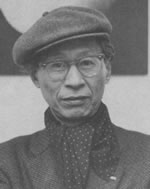
D. Sources of Influence and Transmission
29. Kitasono, Katue, and VOU. 1936~66.
 |
|||
| A ‘civilized
man who can give a serious answer to a serious question’. The
external link ( |
|||
 |
 |
||
 |
 |
||
| Top left: the 1954
annual of the ‘vurry lively and simpatique rev[iew] / in the
sun rise’ ; right: Kitasono’s collected English-language
poems appeared from Robert Creeley’s Divers Press in 1954. Both
external links ( |
|||
Kitasono’s importance here comes by way of his connection with and influence upon Pound, with whom he maintained a thirty-year correspondence, 1936 to 1966 (see BK82b), though the two never met but in text. Particularly in the late thirties, as Pound was increasingly cut off from confidants in England and the United States, he turned to Kitasono as a sounding board for the ideas with which he was preoccupied (see BK17g, 45f, 48, 56c, 59h, 82b1-14, D1c, and 22 ), and rarely missed an opportunity in print to note the importance of Kitasono’s poetics and the anti-establishment voice of his journal, VOU and the poets who published in it. The ‘vurry lively and simpatique rev[iew] / in the sun rise’ (BK80), Pound believed, or said he did, was ‘a better literary magazine’ and ‘wider awake’ than any in Europe or America (BK59i), and the ‘liveliest magazine of young letters in the world’ (BK55). By 1938 Pound had arrived at the conclusion that ‘it may be from now on that any man who wants to write English poetry will have to start reading Japanese’, for ‘all the moss for twenty years we have been trying to scrape off our language—these young men [Kitasono and the Vou club poets] start without it’ (BK46). In that year the Pound of Guide to Kulchur (BK45) fails to find much civilisation in the modern world, but in a key chapter turns to Kitasono, the ‘civilized man’ who can give ‘a serious answer to a serious question’ (see 45c), and the outline of Kitasono’s poetics there has been found by at least one writer to be central to Pound’s own mature style (see BK124). For Pound’s other references to Kitasono in print see BK53, 54, 56a, 61, and 76a, and for related material see A49b, BK49, 59, 59h, 116, 126, 130, 176a, 176g-i, 181, 184a, and 205. Kitasono’s collected English poems, Black Rain: Poems and Drawings, appeared from Robert Creeley’s Divers Press in 1954. Selected translation of his work in Japanese may be found in John Solt, trans., Glass Beret: The Selected Poems of Kitasono Katue (Milwaukee: Morgan Press, 1995). His complete poems in English and Japanese are in Fujitomi Yasuo, ed., Kitasono Katue zen shishû (Complete poems, Tokyo: Chusekisha, 1983). See also Solt’s, Shredding the Tapestry of Meaning: The Poetry and Poetics of Kitasono Katue (BK208) and Fujitomi Yasuo, Kitasono Katue (in Japanese, Tokyo: Yûseidô, 1983).

